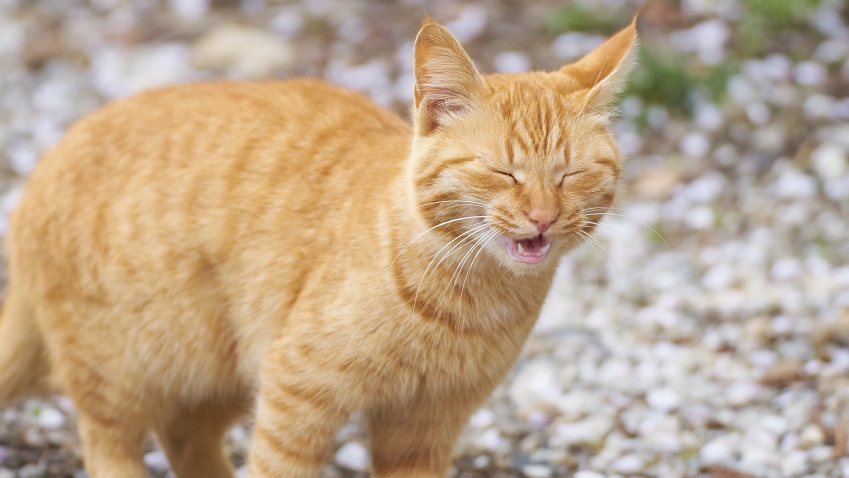
What do you mean my cat has Herpes???
Before you sit your cat down for a serious discussion or ground them by taking away catnip toys…Herpesvirus in cats is primarily a respiratory disease.
Herpesvirus is an extremely common virus in the feline population (both domestic and wild). The majority of kittens already test positive for exposure by 8 weeks of age. Infected mothers can pass it on to their kittens as young as 3-4 weeks of age. Kittens are the most likely to have severe clinical signs and it can cause death in them.
Herpesvirus manifests itself clinically by causing excessive sneezing, swelling/congestion in nasal passages, increased clear nasal fluid production (evident when they shower you while sneezing or you see it all over the windows or by noting exaggerated swallowing), irritation to the cornea and conjunctiva of the eye (causes squinting, increased tearing, redness) and sometimes sores around the nasal passages. It can present with a fever which causes decreased appetite and lethargy. Appetite is often decreased due to the congestion and not being able to smell food as well (just like when we are congested).
In the majority of cats or kittens with herpesvirus, it will be intermittent, low grade bouts on and off a few times during lifespan. However, in some cats it leads to a chronic inflammation and destruction of nasal turbinates leading to persistant congestion and secondary infection. If young kittens are severely affected, they may have damage to their tear ducts causing a permanent watery eye.
The most important things we can do for cats with herpesvirus is to keep current on the Feline Distemper vaccine (this includes vaccination against the herpesvirus to minimize the severity of signs), make sure during flare up’s that they are continuing to eat and drink (sometimes enticing with stinky, fishy food or tuna water) and for young kittens, keeping warm and dry.
Treatments for herpesvirus includes L-Lysine supplementation which stops the body from producing Arginine (another amino acid) which is what the herpesvirus uses for replication, minimizing stress as this suppresses the immune system, adding anti-viral medication including one specifically for herpesvirus, steam treatments to break up congestion and supportive nutritional care. Cats with herpesvirus (remember this is most cats) can be more prone to secondary bacterial infections of the nose, skin or eyes as will be evidenced by production of green discharge from the nose or eyes. If the green discharge is occurring, then and only then, would an antibiotic would be indicated.
Kittens have a lot of stressful situations to deal with: Leaving mom and littermates, potentially having intestinal parasites, fleas, ear mites, adjusting to a new home and a new routine and a new diet, growing, teething, appointments for exams and processing vaccinations, anesthesia, surgery for neuter and recovery. An increase in sneezing and an intermittent teary or squinting eye would not be uncommon during these times of stress. You should monitor closely for normal, mischievous behavior, good appetite, no green discharge and continued growth. The sneezing itself can take months to fully resolve but they will feel normal and get into lots of trouble (like normal kittens do).
The last little exciting tidbit about herpesvirus in cats is that it is, like in people, FOREVER. The virus goes dormant in the body and may not ever cause signs again, it may come and go intermittently, or it may continue to cause signs pretty consistently. We use treatments to resolve clinical signs (gain dormancy) and secondary infections but there is not ever going to be a complete cure. The virus will always be latent (dormant) in the system.
Ok, now that we understand Herpes in cats and how it is transmitted, we can try to minimize stress and make sure they are getting what they need but they probably don’t need to be grounded!



